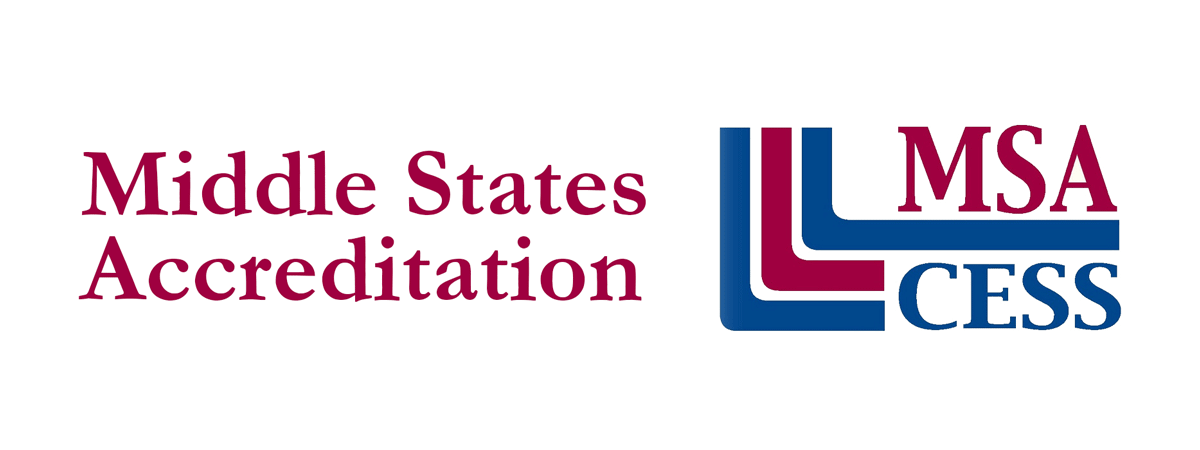Accreditation

Bishop Grimes is accredited by the Middle States Association Commissions on Elementary and Secondary Schools (MSA-CESS) using the Excellence by Design protocol. In order to be accredited, Bishop Grimes underwent a two-year-long self-study process that involved surveying stakeholders, analyzing student data, creating student performance objectives based on the results of the analyzed data, and providing evidence and documentation that the school met the twelve standards of excellence that MSA-CESS has designated as necessary to be accredited.
WHAT IS MIDDLE STATES ACCREDITATION?
MSA-CESS accredits PreK-12 public, private, parochial, charter, non-degree granting career and technical post-secondary institutions, special purpose schools, supplementary education centers, learning services providers, and distance education institutions.
MSA-CESS’s traditional region includes Delaware, Maryland, New Jersey, New York, Pennsylvania, and the District of Columbia, as well as 85 countries in Europe, Africa, the Middle East, the Subcontinent of Asia, and other regions around the world. In recent years, through its cooperative partners, CESS has expanded its scope to include schools and institutions seeking accreditation throughout the United States and around the world.
The fact that Bishop Grimes is an accredited school means that there are certain benchmarks that the school has met and continues to meet on an annual basis. The profile of an accredited school includes:
- Adhering to the Middle States Standards for Accreditation;
- Using the school’s mission, beliefs, and goals as the basis for daily decision-making;
- Operating in the public interest and in accordance with ethical practice;
- Accepting responsibility for the level of performance of its students;
- Remaining committed to continuous improvement in student learning and to its capacity to produce the levels of learning desired and expected by its community;
- Operating in a collegial and collaborative way with all of its stakeholders;
- Sustaining its focus on implementing recommendations, addressing monitoring issues, and correcting stipulations that may be part of its notification of accreditation as well as fulfilling its maintenance requirements to the Commissions.
WHY DOES ACCREDITATION MATTER?
Involvement in an ongoing accreditation protocol recognizes achievement while fostering and facilitating ongoing school improvement.
Accreditation:
- Provides a systematic process that requires a school to justify its existence, establish a vision of its future, and determine specific objectives to realize that vision.
- Reveals information that serves as a sound basis for school or district improvement, strategic planning, restructuring, and staff development.
- Takes a holistic approach, examining the entire school-philosophy and goals, its community, programs and services, facilities and financial stability.
- Provides the means to manage change through regular assessment, planning, implementation, and reassessment.
- Helps school establish priorities for improvement by using comprehensive, research-based needs assessments, rather than faddish approaches to improvement.
- Requires the establishment and implementation of a multi-year improvement plan based upon the school’s vision of the future.
- Provides an excellent growth experience for staff, who participate on volunteer visiting teams to evaluate other schools.
Accreditation provides a means for public accountability by:
- Validating the integrity of a school’s program and student transcripts.
- Assuring that the school’s purposes are appropriate and accomplished through a viable educational program.
- Justifying the faith and resources others place in the school.
Accreditation fosters stakeholder involvement and commitment by providing opportunities for greater involvement in charting the direction and future of the school. Accreditation offers a mechanism to involve constituent groups in creating a vision of the future, not just allowing it to happen.
Accreditation builds positive community and stakeholder relations by:
- Providing opportunities to emphasize the positive and demonstrate the strength and effectiveness of the school.
- Broadening the staff view of community expectations and fostering closer school and community collaboration.
- Articulating and communicating opportunities between school levels and among stakeholder groups.
Bishop Grimes was reaccredited in 2023 for the next seven years. For more information on the Middle States Accreditation click here.
